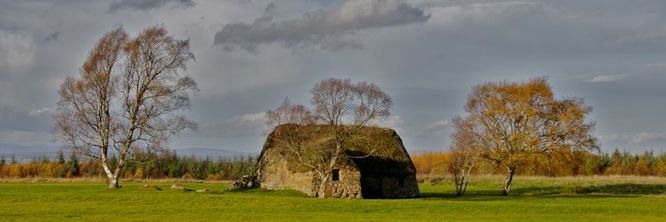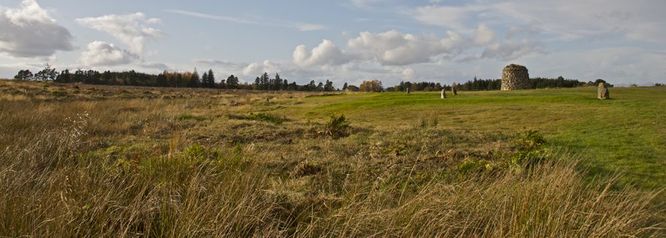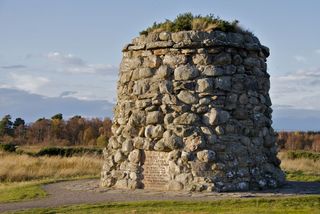 I've tried to write a post about Culloden a few times now. Every time I put it away again, because I start sounding like a history teacher, and I'm certainly not qualified, nor am I interested, in teaching anything.
I've tried to write a post about Culloden a few times now. Every time I put it away again, because I start sounding like a history teacher, and I'm certainly not qualified, nor am I interested, in teaching anything.
The truth is that I came to know about Culloden under the least high-minded of ways - through historical fiction. When reading historical fiction, I always try to keep in mind that what I'm reading isn't history - it's fiction. I'm putting a lot of trust in the author to do the research, and stay faithful to the facts, but it's not a history book.
Still - a good novel will stay with you, and the characters in a novel that really touches you seem to find a place to reside inside. Especially when a certain reader has read six books, at a total of 6464 pages, all staring the same family. That's enough to make you really feel like you know somebody! I mean - some fictional character.
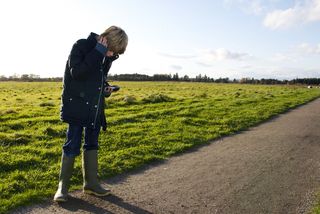 It was the book Outlander, by Diana Gabaldon (the first in her series), that first introduced me to Culloden. The family that the books were built around, the Frasier Clan, was very involved with Bonnie Prince Charlie, and the Cause in general. And here is a perfect example of the hair-thin line we historical fiction readers walk. The Frasier Clan was real. I stood on the Culloden battlefield, exactly where they stood to start the charge. Bonnie Prince Charlie was real. I looked at little 18th century lockets with portraits of him inside the Culloden Center. Culloden was real - and unimaginable in it's carnage and brutality. Jamie Frasier, on the other hand, is not real. Neither is Claire Frasier, or any member of the Frasier clan, written about so vividly in the Outlander books.
It was the book Outlander, by Diana Gabaldon (the first in her series), that first introduced me to Culloden. The family that the books were built around, the Frasier Clan, was very involved with Bonnie Prince Charlie, and the Cause in general. And here is a perfect example of the hair-thin line we historical fiction readers walk. The Frasier Clan was real. I stood on the Culloden battlefield, exactly where they stood to start the charge. Bonnie Prince Charlie was real. I looked at little 18th century lockets with portraits of him inside the Culloden Center. Culloden was real - and unimaginable in it's carnage and brutality. Jamie Frasier, on the other hand, is not real. Neither is Claire Frasier, or any member of the Frasier clan, written about so vividly in the Outlander books.
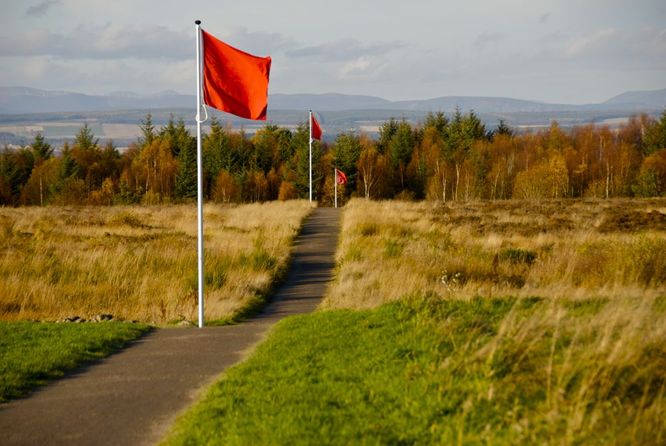 Is it disrespectful somehow to the real men who fought there to hang emotion and empathy on a fictional framework? I don't know.
Is it disrespectful somehow to the real men who fought there to hang emotion and empathy on a fictional framework? I don't know.
Culloden, even though a small and quick battle by any standards, had resounding repercussions, and not only throughout Scotland. When the Jacobites fell, so soundly, for the last time, everything changed for the Scots. The government started a campaign to destroy the Clan system and the power Clan Chiefs wielded. Estates were taken away from Clan leaders, and given to Government supporters. Clergy were forced to swear allegiance to the Government. It became illegal to wear plaid or play bagpipes. In the face of this oppression, many Scots left. They went to Colonial America, and a few years later many fought in the Revolutionary War, the great majority on the side of the Colonies. How extraordinary!
So, here's what I'll say about Culloden: We spent the entire day there, letting all other plans go. It was a cold, sunny, quiet day. We wandered the expansive battleground with an audio-guide to their ears, imagining a day of thundering cannon and screaming, charging Scots in kilts. We wandered through the Center, looking at maps and artifacts, reading accounts written by witnesses - willing and unwilling - who survived that day, and went home to live through the aftermath.
I have a prejudice against war. I don't really buy into the whole noble duty and honor line. Maybe I'm a wrong. Maybe my smug surety in my point of view is born of a lack of personal experience. I'll be pondering it.
